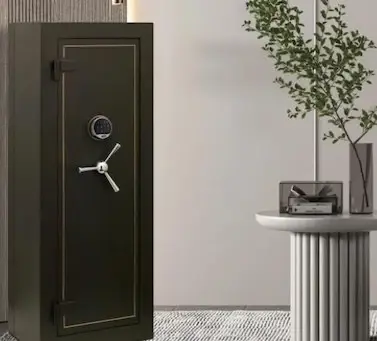Given the many daily concerns, your home security shouldn't be one of them. Reliable, high-quality locks on your front and back doors provide peace of mind, whether you're away or at home relaxing, taking a shower, or sleeping.
Locks are your primary defense against burglars and unauthorized intruders. Home burglaries are unfortunately common, and the intruder isn't always a complete stranger. It could be someone you know, like a previous tenant, a former roommate, or even a separated partner.
Preventing illegal entry is crucial for proactive home security. The most effective security systems use a layered approach that combines various devices. Good exterior lighting and clear visibility are essential components. Motion-activated sensors are also an excellent security measure. However, nothing compares to the effectiveness of high-quality locks that provide proper key and access control.

When to Replace Door Locks
There are various situations in which you might not have full control over your door locks. These could have arisen before you moved into your home or due to events that occurred while you were away. Regardless of the cause of compromised locks, there are effective solutions to help you regain control over your home security. Knowing when to replace your locks is key to maintaining peace of mind.
How often should you replace your locks? The answer depends on several factors. Let's explore the top ten reasons for changing door locks and then discuss the best solutions, including some of the most popular lock products and services available.
Moving into a New Home with Existing Locks
When you move into a new home, even if it's newly built, there's no guarantee that you have the only set of keys for your front and back doors. Builders often use universal construction locks during the building process, which are shared with subcontractors and suppliers for ease of access. Although competent builders typically replace these with exclusive homeowner locks upon completion, you can't be certain who else might have duplicate keys, including master keys.
Realtor lockboxes, commonly found on homes for sale, pose another risk. They hold keys for easy access by realtors, potential buyers, and other agents, meaning multiple people may have had access to these keys, increasing the likelihood of duplicates.
Purchasing a home from an existing owner also has its security risks. The keys you receive may have been copied by previous owners, their families, guests, or even tenants if the home was rented. You have no way of knowing how many duplicates exist or who might have them.
Don't assume that your new home has secure locks. Replacing the door locks is a small investment for the peace of mind that comes with knowing only you have the keys. This is especially important when you're most vulnerable, like when you're asleep or in the shower.
After a Break-In
Experiencing a burglary is a deeply upsetting violation of your personal space, and it's crucial to assume the worst when it comes to security. Even if you believe all your keys are accounted for, you can't be certain that duplicates aren't in the wrong hands. Burglars could have made copies of your keys, giving them future access to your home.
Often, burglaries occur by manipulating or picking locks, indicating that your locks may be inferior and vulnerable to repeat incidents. Additionally, locks can be damaged during a break-in, making them more susceptible to future forced entries.
Replacing your locks after a burglary is a small price to pay to prevent a recurrence. Moreover, failing to do so could impact your insurance claims. If stolen keys are used for a subsequent burglary and you haven't changed your locks, your insurance company might consider you negligent and deny your claim. Changing your locks is a preventative measure that helps ensure your home remains secure.
Lost or Stolen Keys
Losing your keys is a common inconvenience, leaving you locked out and possibly needing to call a locksmith, which can be both frustrating and costly. However, when your keys are stolen, it's an entirely different scenario. Unlike lost keys, stolen keys are in the hands of someone with potentially malicious intent, posing an immediate security risk.
Whether you've misplaced your keys or had them stolen, the best course of action is to replace your locks immediately. Waiting and hoping your keys will be found or returned is risky; it's better to act swiftly to ensure your home remains secure and avoid the higher cost of a potential security breach.
After Renovations
Renovations often involve multiple tradespeople and suppliers accessing your home while you're away. Carpenters, painters, plumbers, electricians, and even your general contractor may need access. Even if you trust your main contractor, you can't be certain about the subcontractors and their associates. There's always a risk that your house keys could be copied and fall into the wrong hands.
Replacing your door locks once renovations are complete is a small fraction of your overall remodeling budget. It's a wise investment to ensure your home remains secure and your peace of mind intact.
Desiring a Change of Style
Renovating your home often includes updating its style, and your door locks, though small, play a significant role in the overall aesthetic. Your current locks might not align with your preferred brand or style, perhaps appearing outdated or mismatched. For instance, you may want to swap bright brass locks for brushed nickel or shiny chrome for dark steel to better suit your new décor.
Changing locks to match your new style is an easy decision. The real challenge, and part of the fun, lies in choosing the perfect style from a multitude of available products. These small details can significantly enhance the look and feel of your revamped space.
Inferior or Low-Quality Locks
In many older homes or mass-built developments, builders often opt for the cheapest locks to maximize profits, potentially compromising security. Inferior locks are easier for burglars to break or pick, making your home a target.
Burglars assess the quality of locks when casing a property, and they can easily identify subpar security measures. Replacing old, low-quality locks with modern, high-quality ones can serve as a significant deterrent. Thieves know that breaking into a well-secured home is not worth the effort, making the investment in better locks highly worthwhile.
Old and Worn-Out Locks
Locks, like any other mechanical device, wear out over time due to repeated use. Signs of aging may include tarnish, rust, stiffness, or excessive looseness. Worn-out locks are prone to failure, and burglars can exploit these weaknesses to gain easy entry.
New locks, on the other hand, are robust and difficult to tamper with, ensuring that your home remains secure. Although there's a saying that "locks are for honest people," the true goal is to allow honest individuals entry while keeping out those with dishonest intentions. Regularly replacing old, worn-out locks is crucial for maintaining a secure home.
Ending a Rental or Roommate Agreement
Changing locks is essential when ending a rental or roommate arrangement. While most tenants or roommates return keys at the end of their stay, there's no guarantee that keys haven't been duplicated or shared with others without your knowledge or permission.
To ensure complete control over access to your home, it's wise to replace the locks after a tenant or roommate leaves, even if you've immediately welcomed a new occupant. This ensures that your home remains secure and that only authorized individuals have access.
Following a Break-Up or Divorce
After a break-up or divorce, changing your locks becomes a crucial safety measure. It's important not just for peace of mind but for actual security. Unwanted visits from an estranged partner can be distressing and potentially dangerous.
Replacing your locks ensures that the individual no longer has access to your home. Be cautious about who receives keys to the new locks, as maintaining control over who can enter your home is your first line of defense against unwanted intrusion.
Adapting to a Disability
A change in lifestyle due to a disability can necessitate modifications to your home, including the locks. Traditional locks can be difficult to operate for those with mobility or dexterity issues.
Fortunately, there are modern solutions designed to enhance accessibility, such as smart lock systems that offer keyless entry and can be operated via smartphone or security codes. Investing in these advanced systems provides a versatile and convenient security solution, allowing for remote access and the ability to grant temporary permissions, ensuring your home remains accessible and secure for everyone.
Solutions for Replacing Your Door Locks
To address your security concerns, you have two main options: rekeying your existing locks or completely replacing them. Both methods involve certain costs and have distinct advantages and disadvantages.
Rekeying Your Locks
Rekeying is a straightforward process that requires the expertise of a professional locksmith. It goes beyond simply copying or cutting a new key at a local hardware or big-box store. The locksmith will remove the lock cylinder and reconfigure the internal springs and pins to match a new key profile. Often, these components may be worn out and need replacing, which can increase the cost beyond that of an entire lock replacement.
Replacing Your Locks
Replacing your door locks is often the best solution. New locks provide the durability and security needed to withstand potential burglar attempts. Additionally, they offer a fresh appearance that can complement any redecorating plans, making your entrance look inviting and secure. When comparing the cost and benefits, replacing locks typically offers better value than rekeying.
Advanced Lock Solutions
If you're considering replacing your locks for any of the ten reasons previously discussed, it's worth exploring high-tech keyless entry systems like Smart Locks. These sophisticated systems offer numerous advantages over traditional locks, such as virtual keys, keyless access, enhanced security, remote locking capabilities, timed automatic locking, and the ability to generate one-time access codes for temporary visitors.
Investing in a Smart Lock not only modernizes your home security but also provides convenient and versatile solutions for managing access to your home. Whether you're addressing past security issues or planning a style upgrade, replacing your old locks with advanced technology ensures that your home remains secure and up-to-date.

 Español
Español 中文
中文
